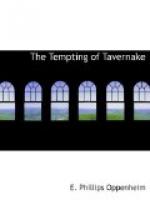“What does it mean?” he demanded, with shaking voice. “Did you see that he was there with Pritchard—your young man—that wretched estate agent’s clerk? I tell you that Pritchard was pumping him for all he was worth.”
“My dear father,” she whispered, coldly, “don’t be melodramatic. You give yourself away the whole time. Go to bed if you can’t behave like a man.”
The lights had been turned low, there was no one else in the room. The little old gentleman with the eyeglass leaned forward.
“Have you any notion, my dear Elizabeth,” he asked, “why our friend Pritchard is so much in evidence just at present?”
“Not on account of you, Jimmy,” she answered, “nor of any one else here, in fact. The truth is he has conceived a violent admiration for me—an admiration so pronounced, indeed, that he hates to let me out of his sight.”
They all laughed uproariously. Then Walter Crease, the journalist, leaned forward,—a man with a long, narrow face, yellow-stained fingers, and hollow cheekbones. He glanced around the room before he spoke, and his voice sounded like a hoarse whisper.
“See here,” he said, “seems to me Pritchard is getting mighty awkward. He hasn’t got his posse around him in this country, anyway.”
There was a dead silence for several seconds. Then the little old gentleman nodded solemnly.
“I am a trifle tired of Pritchard myself,” he admitted, “and he certainly knows too much. He carries too much in his head to go around safely.”
The eyes of Elizabeth were bright.
“He treats us like children,” she declared. “To-night he has told the whole of my affairs to a perfect stranger. It is intolerable!”
The little party broke up soon after. Only Walter Crease and the man called Jimmy Post were left talking, and they retired into the window-seat, whispering together.
Tavernake, with his hands thrust deep in his overcoat pockets, left the hotel and strode along the Strand. Some fancy seized him before he had gone many paces, and turning abruptly to the left he descended to the Embankment. He made his way to the very seat upon which he had sat once before with Beatrice. With folded arms he leaned back in the corner, looking out across the river, at the curving line of lights, at the black, turgid waters, the slowly-moving hulk of a barge on its way down the stream. It was a new thing, this, for him to have to accuse himself of folly, of weakness. For the last few days he had moved in a mist of uncertainty, setting his heel upon all reflection, avoiding every issue. To-night he could escape those accusing thoughts no longer; to-night he was more than ever bitter with himself. What folly was this which had sprung up in his life—folly colossal, unimaginable, as unexpected as though it had fallen a thunderbolt from the skies! What had happened to change him so completely!




